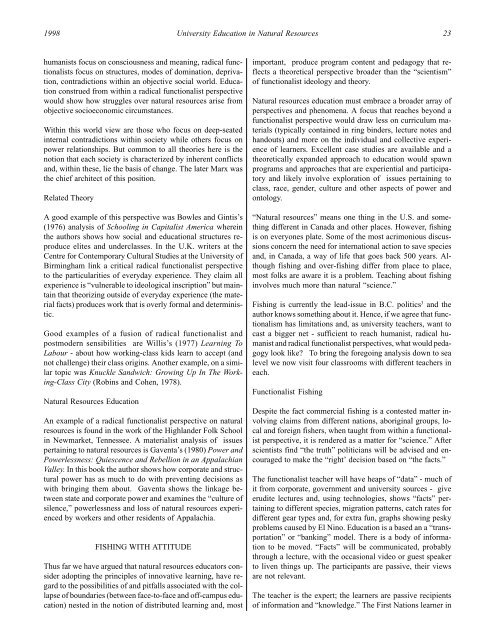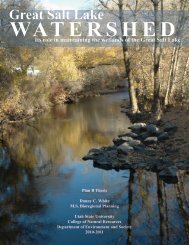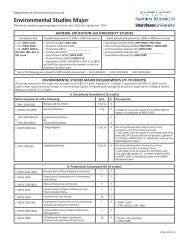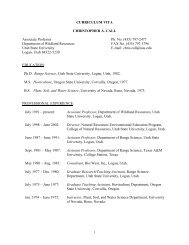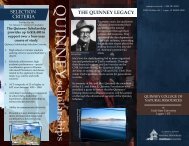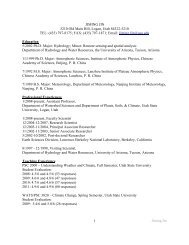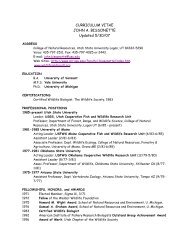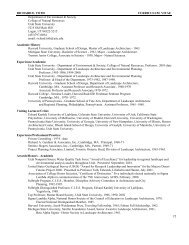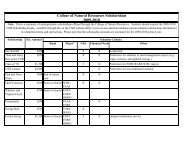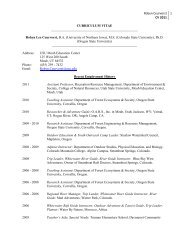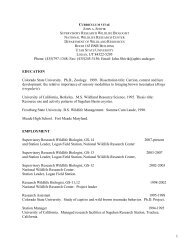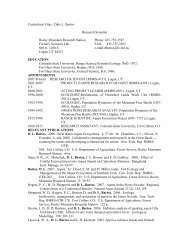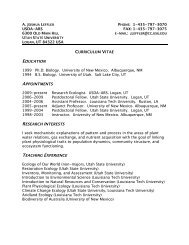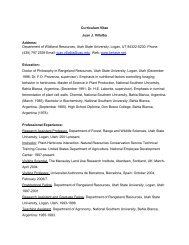University Education in Natural Resources - CNR Home - Utah State ...
University Education in Natural Resources - CNR Home - Utah State ...
University Education in Natural Resources - CNR Home - Utah State ...
You also want an ePaper? Increase the reach of your titles
YUMPU automatically turns print PDFs into web optimized ePapers that Google loves.
1998<br />
<strong>University</strong> <strong>Education</strong> <strong>in</strong> <strong>Natural</strong> <strong>Resources</strong> 23<br />
humanists focus on consciousness and mean<strong>in</strong>g, radical functionalists<br />
focus on structures, modes of dom<strong>in</strong>ation, deprivation,<br />
contradictions with<strong>in</strong> an objective social world. <strong>Education</strong><br />
construed from with<strong>in</strong> a radical functionalist perspective<br />
would show how struggles over natural resources arise from<br />
objective socioeconomic circumstances.<br />
With<strong>in</strong> this world view are those who focus on deep-seated<br />
<strong>in</strong>ternal contradictions with<strong>in</strong> society while others focus on<br />
power relationships. But common to all theories here is the<br />
notion that each society is characterized by <strong>in</strong>herent conflicts<br />
and, with<strong>in</strong> these, lie the basis of change. The later Marx was<br />
the chief architect of this position.<br />
Related Theory<br />
A good example of this perspective was Bowles and G<strong>in</strong>tis’s<br />
(1976) analysis of School<strong>in</strong>g <strong>in</strong> Capitalist America where<strong>in</strong><br />
the authors shows how social and educational structures reproduce<br />
elites and underclasses. In the U.K. writers at the<br />
Centre for Contemporary Cultural Studies at the <strong>University</strong> of<br />
Birm<strong>in</strong>gham l<strong>in</strong>k a critical radical functionalist perspective<br />
to the particularities of everyday experience. They claim all<br />
experience is “vulnerable to ideological <strong>in</strong>scription” but ma<strong>in</strong>ta<strong>in</strong><br />
that theoriz<strong>in</strong>g outside of everyday experience (the material<br />
facts) produces work that is overly formal and determ<strong>in</strong>istic.<br />
Good examples of a fusion of radical functionalist and<br />
postmodern sensibilities are Willis’s (1977) Learn<strong>in</strong>g To<br />
Labour - about how work<strong>in</strong>g-class kids learn to accept (and<br />
not challenge) their class orig<strong>in</strong>s. Another example, on a similar<br />
topic was Knuckle Sandwich: Grow<strong>in</strong>g Up In The Work<strong>in</strong>g-Class<br />
City (Rob<strong>in</strong>s and Cohen, 1978).<br />
<strong>Natural</strong> <strong>Resources</strong> <strong>Education</strong><br />
An example of a radical functionalist perspective on natural<br />
resources is found <strong>in</strong> the work of the Highlander Folk School<br />
<strong>in</strong> Newmarket, Tennessee. A materialist analysis of issues<br />
perta<strong>in</strong><strong>in</strong>g to natural resources is Gaventa’s (1980) Power and<br />
Powerlessness: Quiescence and Rebellion <strong>in</strong> an Appalachian<br />
Valley. In this book the author shows how corporate and structural<br />
power has as much to do with prevent<strong>in</strong>g decisions as<br />
with br<strong>in</strong>g<strong>in</strong>g them about. Gaventa shows the l<strong>in</strong>kage between<br />
state and corporate power and exam<strong>in</strong>es the “culture of<br />
silence,” powerlessness and loss of natural resources experienced<br />
by workers and other residents of Appalachia.<br />
FISHING WITH ATTITUDE<br />
Thus far we have argued that natural resources educators consider<br />
adopt<strong>in</strong>g the pr<strong>in</strong>ciples of <strong>in</strong>novative learn<strong>in</strong>g, have regard<br />
to the possibilities of and pitfalls associated with the collapse<br />
of boundaries (between face-to-face and off-campus education)<br />
nested <strong>in</strong> the notion of distributed learn<strong>in</strong>g and, most<br />
important, produce program content and pedagogy that reflects<br />
a theoretical perspective broader than the “scientism”<br />
of functionalist ideology and theory.<br />
<strong>Natural</strong> resources education must embrace a broader array of<br />
perspectives and phenomena. A focus that reaches beyond a<br />
functionalist perspective would draw less on curriculum materials<br />
(typically conta<strong>in</strong>ed <strong>in</strong> r<strong>in</strong>g b<strong>in</strong>ders, lecture notes and<br />
handouts) and more on the <strong>in</strong>dividual and collective experience<br />
of learners. Excellent case studies are available and a<br />
theoretically expanded approach to education would spawn<br />
programs and approaches that are experiential and participatory<br />
and likely <strong>in</strong>volve exploration of issues perta<strong>in</strong><strong>in</strong>g to<br />
class, race, gender, culture and other aspects of power and<br />
ontology.<br />
“<strong>Natural</strong> resources” means one th<strong>in</strong>g <strong>in</strong> the U.S. and someth<strong>in</strong>g<br />
different <strong>in</strong> Canada and other places. However, fish<strong>in</strong>g<br />
is on everyones plate. Some of the most acrimonious discussions<br />
concern the need for <strong>in</strong>ternational action to save species<br />
and, <strong>in</strong> Canada, a way of life that goes back 500 years. Although<br />
fish<strong>in</strong>g and over-fish<strong>in</strong>g differ from place to place,<br />
most folks are aware it is a problem. Teach<strong>in</strong>g about fish<strong>in</strong>g<br />
<strong>in</strong>volves much more than natural “science.”<br />
Fish<strong>in</strong>g is currently the lead-issue <strong>in</strong> B.C. politics 3 and the<br />
author knows someth<strong>in</strong>g about it. Hence, if we agree that functionalism<br />
has limitations and, as university teachers, want to<br />
cast a bigger net - sufficient to reach humanist, radical humanist<br />
and radical functionalist perspectives, what would pedagogy<br />
look like? To br<strong>in</strong>g the forego<strong>in</strong>g analysis down to sea<br />
level we now visit four classrooms with different teachers <strong>in</strong><br />
each.<br />
Functionalist Fish<strong>in</strong>g<br />
Despite the fact commercial fish<strong>in</strong>g is a contested matter <strong>in</strong>volv<strong>in</strong>g<br />
claims from different nations, aborig<strong>in</strong>al groups, local<br />
and foreign fishers, when taught from with<strong>in</strong> a functionalist<br />
perspective, it is rendered as a matter for “science.” After<br />
scientists f<strong>in</strong>d “the truth” politicians will be advised and encouraged<br />
to make the “right’ decision based on “the facts.”<br />
The functionalist teacher will have heaps of “data” - much of<br />
it from corporate, government and university sources - give<br />
erudite lectures and, us<strong>in</strong>g technologies, shows “facts” perta<strong>in</strong><strong>in</strong>g<br />
to different species, migration patterns, catch rates for<br />
different gear types and, for extra fun, graphs show<strong>in</strong>g pesky<br />
problems caused by El N<strong>in</strong>o. <strong>Education</strong> is a based an a “transportation”<br />
or “bank<strong>in</strong>g” model. There is a body of <strong>in</strong>formation<br />
to be moved. “Facts” will be communicated, probably<br />
through a lecture, with the occasional video or guest speaker<br />
to liven th<strong>in</strong>gs up. The participants are passive, their views<br />
are not relevant.<br />
The teacher is the expert; the learners are passive recipients<br />
of <strong>in</strong>formation and “knowledge.” The First Nations learner <strong>in</strong>


